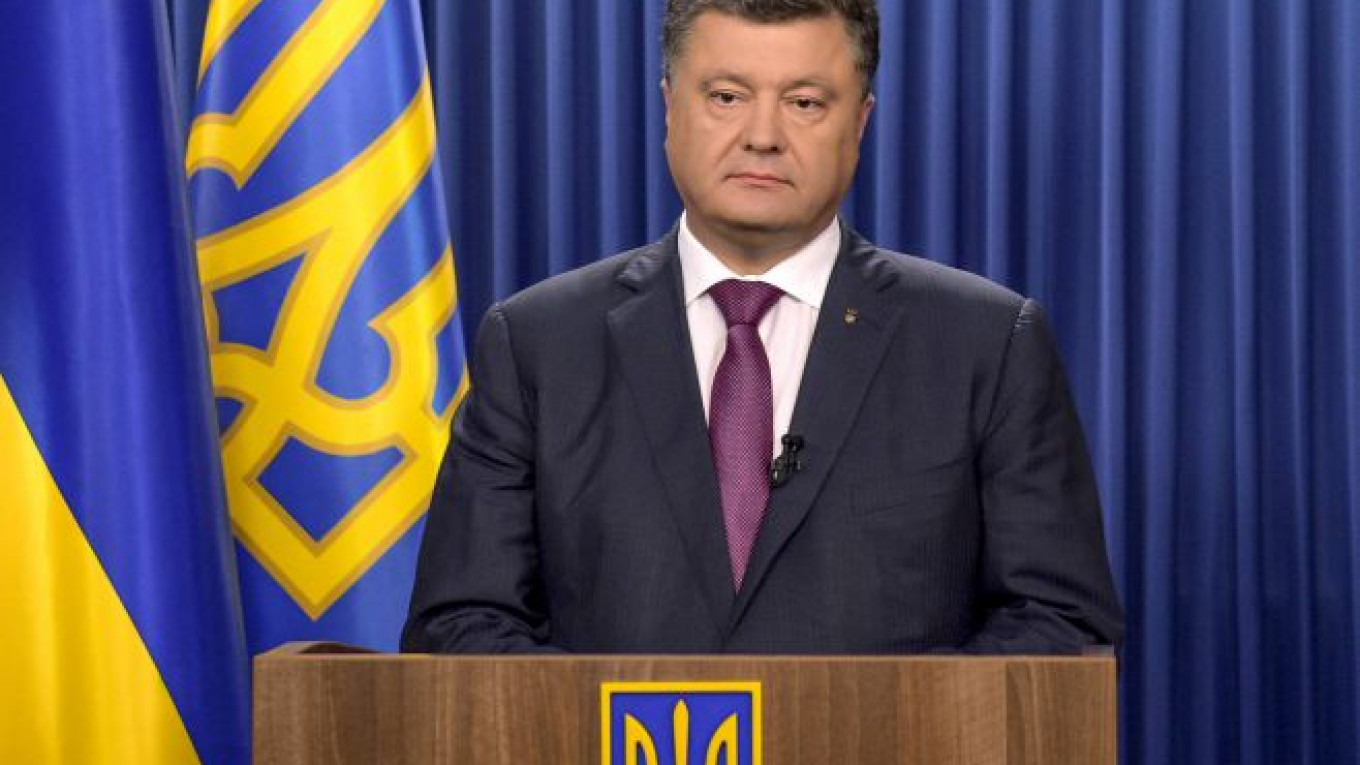President Petro Poroshenko dissolved Ukraine's parliament on Monday and announced an election on Oct. 26 in the country that is fighting a war against separatists that has driven relations with Russia to an all-time low.
Poroshenko's decision had been expected after the governing coalition in Ukraine collapsed in July 24.
Poroshenko and his government, whose pro-Europe policies have riled the Kremlin, hope to stabilize the situation in the east by October sufficiently to hold a relatively normal election that will earn them greater legitimacy and strengthen their hand in dealing with Russia.
"I have taken the decision to dissolve parliament for elections on Oct. 26," Poroshenko said in a Twitter post, urging all Ukrainians to go to the ballot box.
He and his liberal supporters will be seeking an endorsement of the tough line they have taken in the separatist war and their European integration policies which have brought confrontation with Russia.
Moscow, angered by the ousting of Yanukovych who fled following the deaths of more than 100 protesters killed in Kiev by police snipers, annexed Ukraine's Crimean peninsula in March.
Poroshenko's leadership accuses Moscow of being behind the separatist rebellions in Ukraine's Russian-speaking east which broke out shortly afterwards, though Moscow denies this.
In a statement to compatriots on his website on Monday night, Poroshenko hoped the election would clear out many of the "old guard" who supported Yanukovych and produce a coalition able to push through vital economic and political reform after years of corrupt misrule and malpractice.
"The present parliament for a year and a half was a support for Yanukovych. And the majority of precisely these deputies adopted dictatorial laws which took the lives of 'Heaven's Hundred'," he said referring to the protesters who were killed and who have now acquired martyr status in Kiev.
"Someone has to take responsibility for this — criminal and political," he said.
Minsk meeting
He accused some deputies of backing the separatists. "Many deputies are, if they are not the direct sponsors and associates, the supporters of the separatist fighters," he said.
"I consider victory in the Donbass and the victory of democratic reforming forces in parliament a mutually linked process," he said.
Donbass is the name given to the industrialized and mainly Russian-speaking east of Ukraine, where two regions — Donetsk and Luhansk — have declared independence from Ukraine in an attempt to join Russia.
The crisis in Ukraine, in which the UN says more than 2,000 people have been killed, has resulted in the worst crisis between Russia and the West since the end of the Cold War.
The United States and its European allies have imposed broad sanctions on Russia because of its alleged backing for, and arming of, the rebels.
Poroshenko heads for the Belarussian capital of Minsk on Tuesday for his first meeting with Russia's Vladimir Putin since June.
The timing of his election announcement was intended to broadcast to Putin and EU officials, who will also be present in Minsk, that Ukraine was steadily normalizing and building democratic structures after the malpractice of the Yanukovych years.
But with Kiev angered over reports of Russian armored vehicles coming across the border on Monday with the aim of opening a new front in the separatist war the prospects of a breakthrough in Minsk appear slim.
See also:
A Message from The Moscow Times:
Dear readers,
We are facing unprecedented challenges. Russia's Prosecutor General's Office has designated The Moscow Times as an "undesirable" organization, criminalizing our work and putting our staff at risk of prosecution. This follows our earlier unjust labeling as a "foreign agent."
These actions are direct attempts to silence independent journalism in Russia. The authorities claim our work "discredits the decisions of the Russian leadership." We see things differently: we strive to provide accurate, unbiased reporting on Russia.
We, the journalists of The Moscow Times, refuse to be silenced. But to continue our work, we need your help.
Your support, no matter how small, makes a world of difference. If you can, please support us monthly starting from just $2. It's quick to set up, and every contribution makes a significant impact.
By supporting The Moscow Times, you're defending open, independent journalism in the face of repression. Thank you for standing with us.
Remind me later.






